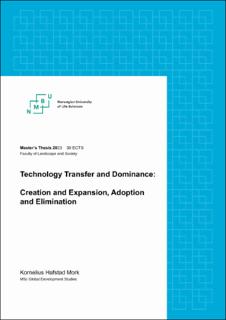| dc.description.abstract | The intent of this thesis is to explore possible indicators to the (re)production of dominance in technology transfer to developing countries, through the expandatory and eliminatory implications of scale and the principles of scaleability. The study investigates the sociocultural preconditions for technological creation through systems of mental repersentation, and the relationship of conceptualizing the world and worldmaking through the expandatory and eliminatory implications of scale, which is demonstrated by reviewing Henry Ford’s establishment of a rubber production town in the Amazon. In addition, the study applies a critical sociocognitive discourse analysis of the World Bank report ‘The Innovation Paradox’ to capture how systems of mental representations and underlying ideological structures may operate to problematize and describe issues and subjects in biased ways. The study concludes that the (re)production of dominance may occur, especially due to the expandatory and eliminatory implications of scale, and particularly when technology transfers are oriented around adoption. | |
